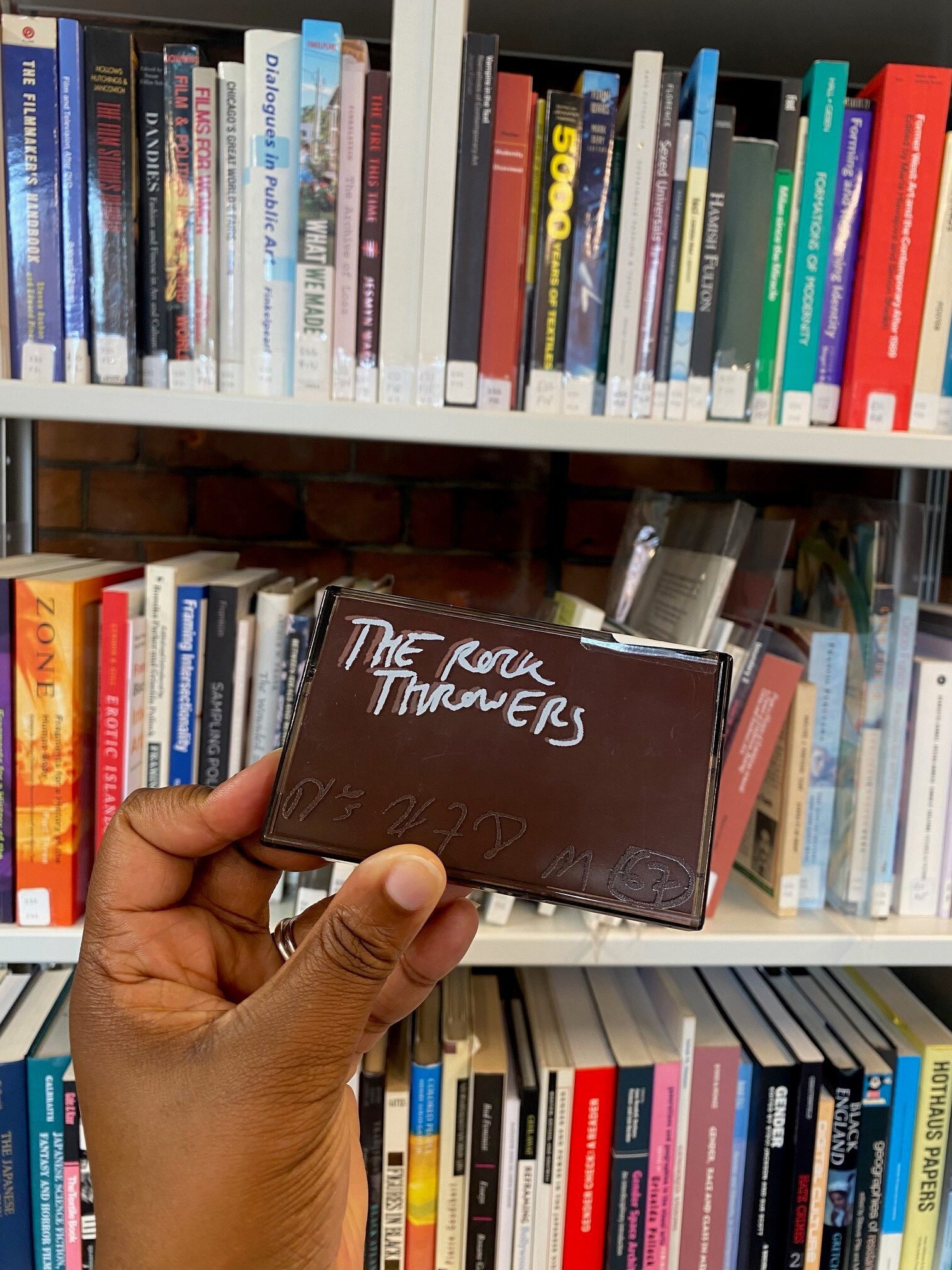
Iamge of the The Rock Throwers tape in Stuart Hall Library.
The following post is a review of our recently catalogued tape The Rock Throwers by our previous volunteer Chloe Tayali.
Centring migrant oral traditions, generational offerings and conversations, curator Amina Jama presents The Rock Throwers; a limited edition cassette tape which integrates research on orality within archival practices, and positions the archive as a living, breathing resource. Drawing from their own personal family archives of cassette tapes from the 1980-90s, Jama recruits time stamping, generational exchange, and ancestral thinking in a deeply personal attempt to reclaim space, tackle erasure, and encourage listeners to abandon comfort and turn towards unfamiliar ground.
Amina Jama, The Rock Throwers: Introduction (2023)
Launched on Thursday 26 January 2023 at Chisenhale Gallery, Amina Jama introduces The Rock Throwers with the Somali phrase (meaning ‘to protest’) that it is translated from and the context of ethnic and governmental suppression to which the phrase applies.
She invokes the Mary Douglas quote ”institutions remember and forget”, to remind us that they decide for a society what to remember and what to avoid. But she also tells us that institutions such as the Stuart Hall Library and Chippendale Gallery Archive hold the same value as family archives. These family archives allow families to record their histories outside of colonial infrastructure, without the comfort museums inject around difficult topics.
We can all share our voices in this way. The Rock Throwers project is based on this expansion of the meaning of the archive. To explore this meaning, Jama has invited three writers to answer questions on the archive: how and what it’s used for, who it exists for, and who guards it.
Adjoa Armah, saman archive (2023)
Adjoa Armah then explains how the saman archive came about and the practical and ethical considerations that she holds as the collection continues to expand. In a voice note, Armah explores her relationship with time, relating it across time to historic Ghanaian practices and memories held by historic coastal buildings on the Atlantic. She discusses the need to take care of oneself when confronting these histories through work, and invites her peers to share their strategies for remaining whole.
Looking at her personal artistic work and her curatorial work for saman, Armah sifts through how she deals with the delicate nature of that work through the lens of the relationships she builds while it is being developed, the ‘secret’ nature of the contents of the archive, and how she finds enough in the development of the archive to fuel her art without exposing the archive.
Aliyah Hasinah, On The Building of Breathing Libraries (2023)
Aliyah Hasinah then reminds us that our social media are effective archives of ourselves, but archives that are closely and maliciously surveilled, especially for Black and Muslim users. The same intent must be considered for larger, institutional Black archives so that the content is effectively protected from ‘bastardisation’.
She further explains the spirituality of sound, and how music and dance are used to survive the West. This is an aspect of ‘sensuous knowledge’ which is both emotional and intellectual, attuned to Black bodies living in the West. Hasinah recommends archival practice starts from our bodies and focuses on communities so that we build living, sustainable archives.
Kaitlene Koranteng, Are you listening?: A Reflection on Orality and the Archive (2023)
Sankofa; looking to the past to shape the future, is how on the final track Kaitlene Koranteng thinks of poetry, history and archiving and the concept informs her work planning the future of iniva’s archive. Koranteng brings orality to the archive as a way to make it alive and to keep alive the breadth of cultural and intellectual traditions in the diaspora.
Citing Black academics, she repeats Hasinah’s call for Black heritage practitioners to intervene in the archive. She shows us the ways orality can be found in other archival media and how sankofa is embodied by poetry such as Jay Bernard’s Surge. Koranteng’s voice note ends with questions, inviting the listener to contribute their thoughts on the archive to those presented in The Rock Throwers.
Biography
Chloe Tayali is a recent graduate MA Architecture student with an interest in the network of relationships between screative practices, community building, institutions and built environment.
Listen to The Rock Throwers